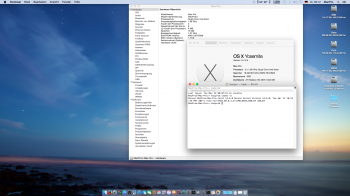Hi there - pretty desperate here as I have work to finish for a client (audio mix) I can only open with my Yosemite system:
I have been using Yosemite with my Mac Pro 1,1 for a year or more without problems (following the method on the first post of this thread) and suddenly the Disk where it is installed doesn't appear on the "Start Up" list on Preferences.
The disk appears on the desktop fine with all the files as it was before but there is no way to startup from it to load my Yosemite system on that disk.
If I start the Mac Pro with "Alt" the disk appears as an option to start up from, but if I click on it, the mac freezes and finally starts automatically from the other disk where I have Snow Leopard (where everything works fine so it not a hardware problem with my Mac Pro).
I have been updating for a year without problems (with PIkeYoseFix I installed initially) and when this problem has occurred I hadn't updated anything for weeks and it was working fine as usual, so it broke out of the blue with no reason since I haven't installed or updated any new soft lately.
I have tested the Yosemite drive with Disk Utility and TechTool Pro 7 and they report the disk is fine.
Should I see if the boot.efi is broken for any reason to replace it?
I really have no clue what to do next and starting all over installing Yosemite would take me days due to all the Apps I have to install for my work with Audio and Video (lots of Plugins)
Would be most grateful for some help.
Thanks
I have been using Yosemite with my Mac Pro 1,1 for a year or more without problems (following the method on the first post of this thread) and suddenly the Disk where it is installed doesn't appear on the "Start Up" list on Preferences.
The disk appears on the desktop fine with all the files as it was before but there is no way to startup from it to load my Yosemite system on that disk.
If I start the Mac Pro with "Alt" the disk appears as an option to start up from, but if I click on it, the mac freezes and finally starts automatically from the other disk where I have Snow Leopard (where everything works fine so it not a hardware problem with my Mac Pro).
I have been updating for a year without problems (with PIkeYoseFix I installed initially) and when this problem has occurred I hadn't updated anything for weeks and it was working fine as usual, so it broke out of the blue with no reason since I haven't installed or updated any new soft lately.
I have tested the Yosemite drive with Disk Utility and TechTool Pro 7 and they report the disk is fine.
Should I see if the boot.efi is broken for any reason to replace it?
I really have no clue what to do next and starting all over installing Yosemite would take me days due to all the Apps I have to install for my work with Audio and Video (lots of Plugins)
Would be most grateful for some help.
Thanks


